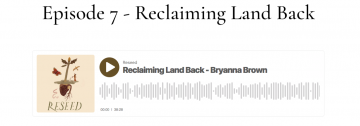Despite being some of the most impacted groups by the COVID-19 pandemic, climate crisis, and systems of inequality and exclusion, Indigenous people protect 80% of biodiversity left in the world and only make up around 6% of the global population. Indigenous youth are demanding their communities’ rights be respected and their voices included in all decision-making that impacts their lives and futures. To celebrate Indigenous youth’s agency and drive, this week in the mentoring circle we highlight the work of 6 young Indigenous women who are leading the way in fighting for a more sustainable future. We are spotlighting Indigenous activists from all over the world who are carving paths to protect our planet.
Hindou Oumarou Ibrahim is a Chadian environmental activist and geographer. She is an expert in Indigenous peoples’ adaptation to climate change, traditional ecological knowledge, and climate change mitigation strategies. From a Mbororo pastoralist community in Chad, she works to empower Indigenous voices and ensure their inclusion on international platforms. Hindou Oumarou Ibrahim has led projects for the protection of the environment using both western science and Indigenous wisdom. In the following TED talk, Hindou Oumarou Ibrahim shares how her nomadic community in Chad is working closely with scientists to restore endangered ecosystems — and offers lessons on how to create more resilient communities.
In Mexico, Indigenous people are increasingly displaced, their land stolen, students disappear without trace following police arrest, and journalists are murdered at an alarming rate. Lupita, a Tsostil Maya massacre survivor, is an Indigenous woman at the forefront of a new movement for Indigenous sovereignty. Twenty years after Lupita lost her family in the Acteal massacre in southern Mexico, she has become a spokesperson for her people and land rights. She balances the demands of motherhood with her high-stakes efforts to re-educate and restore justice. The film below intimately follows Lupita taking on risks and responsibilities to represent her people by confronting corrupt militaries, mobilizing her pueblo’s resistance, and cultivating a new generation of organized and vocal Maya activists.
Nina Gualinga is an Ecuadorian environmental and Indigenous rights activist. She is part of the Kichwa-speaking community and has spent most of her life advocating for better environmental protection of the Ecuadorian Amazon and the inhabitant wildlife as well as the people who are dependent on this environment. Nina Gualinga has been involved since childhood in the struggle to protect Indigenous lands in the Amazon from the ravages of oil extraction, logging, and mining — fighting modern companies that want to exploit their ancestral land. In the following video, watch how Nina Gualinga with a delegation of Indigenous peoples at the Paris COP21 climate conference made sure their voices are heard.
Bryanna Brown is Inuk and Mi’kmaq from Happy Valley-Goose Bay, Labrador. She is a Labrador Land Protector. She originated Land Back to advocate for sovereignty in Indigenous peoples and is focused on land ownership as a means of environmental protection. Bryanna Brown is a member of the Steering Committee of Indigenous Climate Action, an organization that reinforces the place of Indigenous Peoples as leaders in climate change discourse. Through effective advocacy, her mission is to make spaces for Indigenous peoples to feel safe in society, and to provide insights regarding social justice issues, intergenerational trauma affecting Indigenous communities, climate injustice, systemic racism, and cultural revitalization. Listen below to a podcast from Reseed with Bryanna Brown about reclaiming Land Back as an insightful exploration of reclaiming land and reclaiming voice.
Emmanuela Shinta is a Dayak activist and filmmaker whose work is widely known for leading and empowering Indigenous peoples. She is at the forefront of taking an active and peaceful role in preserving the heritage, humanity, and environment of Kalimantan, amidst the infamous haze that engulfs the region each year. In 2016 she started a youth movement to end the forest fires and haze that have been happening for 20 years in Kalimantan. Emmanuela Shinta found her purpose in protecting the Indigenous culture of the Dayak in Indonesia. She sees the rights of her people being violated, so she stands up and advocates for them. She sees forests being cut down and land wasted, so she is mobilizing a movement for climate action. In the following TED talk, Emmanuela Shinta speaks on how modern technologies may keep indigenous cultures alive.
Archana Soreng is an environmental activist belonging to the Indigenous Kharia Tribe from Bihabandh Village of Rajgangpur in Sundergarh, Odisha, India. She has been working for awareness about climate change and documentation, preservation, and promotion of the traditional knowledge and practices of Indigenous communities. Archana Soreng has been selected as one of the seven members of the Youth Advisory Group on Climate Change established by the Secretary-General of the United Nations as a part of the UN Youth Strategy. In the following UN video, she explains why we need to preserve the rights and recognize the critical role Indigenous communities play in protecting our planet and its natural resources. As one of the world’s indefatigable climate activists, Archana Soreng is looking to advocate for change and solutions to protect vulnerable communities and our planet.
